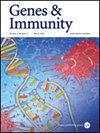Long noncoding RNA PARAL1 regulates myeloid dendritic cell differentiation and TLR signaling
IF 4.5
3区 医学
Q1 GENETICS & HEREDITY
引用次数: 0
Abstract
Dendritic cells (DCs) are professional antigen presentation cells (APCs) that bridge innate and adaptive immune functions to contain pathogenic threats. Long noncoding RNAs (lncRNAs) are implicated in regulating biological processes, including inflammation and immunity. However, the knowledge of myeloid DC-expressed lncRNA repertoire and their regulatory functions is limited. Here we profiled lncRNA expression kinetics during monocyte-to-DC (moDC) differentiation and characterized their functional roles. Our RNA-seq data identified a repertoire of differentially expressed lncRNAs associated with moDC differentiation and a large subset of these lncRNAs are distinct from M1 or M2 macrophages. We selected two DC-enriched lncRNAs and observed that PARAL1 silencing, or overexpression modulates DC surface markers expression. Importantly, PARAL1 RNAi significantly reduced, while its overexpression upregulated the levels of multiple TLRs. Upon treatment with TLR agonists PARAL1 knockdown cells exhibit reduced NF-κB, IRF3 and IRF7 phosphorylation substantiating its role in potentiating TLR signaling. Mechanistically, PARAL1 silencing showed significant downregulation of multiple NF-κB-induced genes and time-dependent inhibition of proinflammatory cytokine secretion upon challenge with TLR agonists. Finally, PARAL1 RNAi in DCs significantly impaired antigen processing and presentation to T cells. Overall, this study characterized novel functions of PARAL1 in regulating DC differentiation, TLR-dependent innate immunity and activation of adaptive immune response.

长链非编码RNA PARAL1调控髓树突状细胞分化和TLR信号传导。
树突状细胞(dc)是一种专业的抗原呈递细胞(apc),它在先天免疫和适应性免疫功能之间架起桥梁,以遏制致病性威胁。长链非编码rna (lncRNAs)参与调节生物过程,包括炎症和免疫。然而,关于髓系dc表达的lncRNA库及其调控功能的知识是有限的。在这里,我们分析了单核细胞向dc (moDC)分化过程中的lncRNA表达动力学,并表征了它们的功能作用。我们的RNA-seq数据确定了一系列与moDC分化相关的差异表达lncrna,其中很大一部分lncrna与M1或M2巨噬细胞不同。我们选择了两个DC富集的lncrna,观察到parar1沉默或过表达可调节DC表面标记物的表达。重要的是,PARAL1 RNAi显著降低,而其过表达上调了多个tlr的水平。经TLR激动剂处理后,parar1敲低的细胞表现出NF-κB、IRF3和IRF7磷酸化降低,证实其在增强TLR信号传导中的作用。从机制上讲,在TLR激动剂的刺激下,PARAL1沉默显示了NF-κ b诱导的多个基因的显著下调和促炎细胞因子分泌的时间依赖性抑制。最后,dc中的PARAL1 RNAi显著损害抗原加工和向T细胞的递呈。总的来说,本研究发现了PARAL1在调节DC分化、tlr依赖性先天免疫和适应性免疫反应激活方面的新功能。
本文章由计算机程序翻译,如有差异,请以英文原文为准。
求助全文
约1分钟内获得全文
求助全文
来源期刊

Genes and immunity
医学-免疫学
CiteScore
8.90
自引率
4.00%
发文量
28
审稿时长
6-12 weeks
期刊介绍:
Genes & Immunity emphasizes studies investigating how genetic, genomic and functional variations affect immune cells and the immune system, and associated processes in the regulation of health and disease. It further highlights articles on the transcriptional and posttranslational control of gene products involved in signaling pathways regulating immune cells, and protective and destructive immune responses.
 求助内容:
求助内容: 应助结果提醒方式:
应助结果提醒方式:


